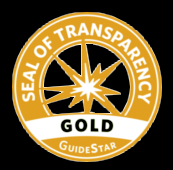Multi-County Meetings
Equine Training for Law Enforcement and Animal Control
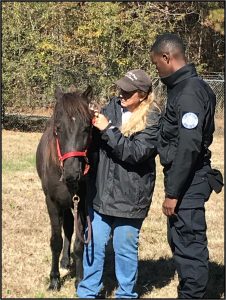 The Georgia Equine Rescue League Ltd. (GERL) hosted the second successful Equine Training for Law Enforcement and Animal Control for the year In Cobb County on November 25th 2019. Over 67 Law enforcement and Animal Control officer were in attendance along with a student from the University of Kentucky’s Equine Management Program.
The Georgia Equine Rescue League Ltd. (GERL) hosted the second successful Equine Training for Law Enforcement and Animal Control for the year In Cobb County on November 25th 2019. Over 67 Law enforcement and Animal Control officer were in attendance along with a student from the University of Kentucky’s Equine Management Program.
GERL is ecstatic to see these officers taking advantage of this unique training opportunity. We are also very happy to see that some of the Equine programs at major Universities are starting to take notice of what we do. This is the second time we have had a student ask to attend. So, what exactly is this training, who are our experts, why it is so important, and what do we hope to accomplishment.
GERL is the only organization to offer this unique training opportunity for law enforcement and Animal Control. Well, what makes it unique? We offer this training at no cost to the Law enforcement officers and Animal control officers. Every year law enforcement officers are required to have professional development. GERL’s training provides Law enforcement with 5 hours POST credit. This may be one of the only free professional development opportunities provided by any organization in the state of Georgia.
We start by introducing GERL and explain what services we can provide to the counties in Georgia. We provide training to help them when they are dealing with a case of equine at large, or dealing with a neglect or cruelty case. What we ask in return for our help is that the counties prosecute the offenders. 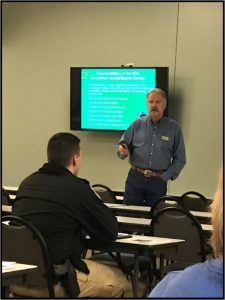 We are able to provide this training because of the like-minded volunteers that are dedicated to help solve the problem of the unwanted horse, abuse and neglect in Georgia. The following are our expert presenters:
We are able to provide this training because of the like-minded volunteers that are dedicated to help solve the problem of the unwanted horse, abuse and neglect in Georgia. The following are our expert presenters:
Mat Thompson from the Department of Agriculture (GDA), is the first to present. Mat Thompson manages the GDA Equine Health Section which is responsible for enforcing the Humane Care for Equines Act of 1992, the Equine Act of 1969 and excerpts of the Animal Protection Act. Enforcement of these laws is achieved through the inspection of equine sales, abuse complaints, licensing stables, and events under his direction. Mat Thompson provides information on Georgia Equine Protection Laws and explains what constitutes equine abuse. He teaches attendees how to body score horses. He then takes the officers outside to demonstrate safe horse handling techniques. This includes how body language affects the horse, where to stand to avoid injury, how to catch, halter, lead, and load. The officers then have the opportunity to practice what they have learned on a horse provided by the GDA.
Next up is Kevin Hearst -he Retired from the position or Field Supervisor/Chief Cruelty Investigator for Dekalb County Animal Services. Kevin has been a member of the National Animal Cruelty Investigations School faculty for over seven years and is recognized as an expert in the field of animal cruelty investigations. This school is recognized as one of the leaders in education for humane investigators. Kevin is asked to and does delivered many presentations for conferences throughout the nation. He also served as liaison In-service instructor for DeKalb Co. Police Academy, Sheriff Office, Code Enforcement, Emergency Management Agency and District Attorney & Solicitor-General’s offices. He is an expert witness in animal cruelty cases due to his extensive knowledge, training, and experience in animal cruelty/equine, dangerous animal and blood sports investigations. Kevin’s presentations are entertaining as well as informative. He concentrates on the proper way to carry out and document animal abuse cases. He always provides humorous accounts of his personal mistakes and successes. He has the attendees participate in group case studies of actual cruelty case. This provides the officers with a chance to look at evidence and discuss the actual aspects of the case while he provides positive feedback. He provides instruction on how to present a prosecutable case to the district attorney, how to testify, how to become an expert witness. This information is invaluable to the training of law enforcement and animal control,
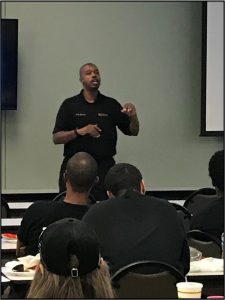 Last presenter is Jessica Rock-Assistant District Attorney, Statewide Animal Crimes Prosecution and Training Attorney. Jessica provides detailed information concerning what she, or any prosecuting attorney needs in order to successfully prepare a case which would insure a conviction. She reiterates the Importance of proper investigation and presentation. After all the goal of all involved is to be able to help reduce the neglected and abused equine in Georgia. It takes a lot time, effort, and money to issue and execute a warrant, prepare a case. All the data support the link between animal cruelty and neglect and criminal activity. It is truly a shame to lose a case or have it dismissed due to lack of evidence.
Last presenter is Jessica Rock-Assistant District Attorney, Statewide Animal Crimes Prosecution and Training Attorney. Jessica provides detailed information concerning what she, or any prosecuting attorney needs in order to successfully prepare a case which would insure a conviction. She reiterates the Importance of proper investigation and presentation. After all the goal of all involved is to be able to help reduce the neglected and abused equine in Georgia. It takes a lot time, effort, and money to issue and execute a warrant, prepare a case. All the data support the link between animal cruelty and neglect and criminal activity. It is truly a shame to lose a case or have it dismissed due to lack of evidence.
Over the past couple of year we are seeing marked increase of the number of law enforcement and animal control officers in attendance. I am sure this is due to the invaluable information and training provided by our team of experts. Without proper training and information, teamwork, and support we will not be successful in helping to reduce the number of neglected and abused equine in Georgia. These law enforcement training class are essential in getting everyone on the same page.
This program is so important to everyone involved that everyone participates on a purely volunteer base. Without the generous donation of these Equine/Animal heroes’ time and expertise this very unique and successful program would not be possible.
What we want to see happen is an increase in the prosecution of equine/animal neglect and cruelty. The state, county law enforcement, city law enforcement, and rescue organizations work together safely to make this happen. We can make a difference!
In this season of giving please consider supporting some our programs with a tax deductible donation to Georgia Equine Rescue League, Ltd. Or come out and volunteer with some our events.
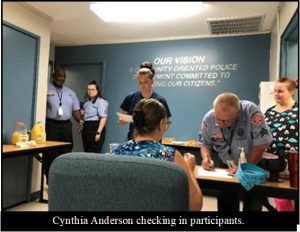 Since 2010, GERL has been hosting what we in GERL land call a “Multi-County Meeting”, a/k/a MCM, when we held our very first law enforcement training meeting. It was at the Golden Corral in Winder and we had invited 10 surrounding counties to attend. We didn’t have a hands-on horse demo, obviously, but we did have a small crowd big enough to fill the private room. We learned that we were going to have to invite a whole lot more than 10 counties if we wanted the program to grow. And grow, it has!
Since 2010, GERL has been hosting what we in GERL land call a “Multi-County Meeting”, a/k/a MCM, when we held our very first law enforcement training meeting. It was at the Golden Corral in Winder and we had invited 10 surrounding counties to attend. We didn’t have a hands-on horse demo, obviously, but we did have a small crowd big enough to fill the private room. We learned that we were going to have to invite a whole lot more than 10 counties if we wanted the program to grow. And grow, it has!
I’m going to attribute most of that to the wonderful team of volunteers that host them. The one who does most of the heavy lifting is our Treasurer, Lynne Robinson. She takes care of sending out all of the invitation letters to all of the animal control and law enforcement agencies within a 2-3 hour driving distance to the facility. She typically will send out over 125 letters. Lynne also serves as GERL’s speaker at every single meeting we host. She’s does a wonderful job of delivering GERL’s message and I couldn’t be more proud. She takes off from her work and drives long distances (Tifton, Jesup, wherever), to attend a MCM and she also makes up all of the training manuals for every attendee, for every meeting.
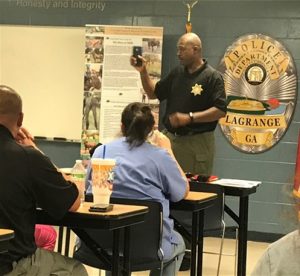 Another member of our team is our secretary, Cynthia Anderson, who oversees the registrations. We had 35 people register for the training class in Tifton. Cynthia, meanwhile, is currently doing double-time with her job so, there was quite a bit of activity for her to juggle. Like Lynne, she took off work and drove down to Tifton late at night to be there early the next morning to set up.
Another member of our team is our secretary, Cynthia Anderson, who oversees the registrations. We had 35 people register for the training class in Tifton. Cynthia, meanwhile, is currently doing double-time with her job so, there was quite a bit of activity for her to juggle. Like Lynne, she took off work and drove down to Tifton late at night to be there early the next morning to set up.
The third member of our team is Board member, Linda Kundell. She takes care of all the staple items required to host a meeting: banners, newsletter, extension cords, paper plates, cups, coffee pot, etc. She is dependable and loyal to this program (and GERL, in general). Linda and I usually ride together to attend MCMs since we live relatively close. She reminds me of a wind-up toy. She has amazing energy and passion for what she does, and I really appreciate that.
The meeting in Tifton was set up for us by Reginia Wells, the Secretary/Treasurer of the American Animal Control Association. We met Regenia in Jesup back in November and she expressed her desire for us to take our show to her area. It was well-attended and the crowd was genuinely interested in the message. The Georgia Department of Agriculture (GDA), Animal Division, was well represented. Equine Manager, Mat Thompson shared his presentation immediately following Lynne. Equine Superintendent, Corey Cravey, delivered the second portion of the Equine training, before everybody went outside to handle the live horse that Corey had brought.
We broke for lunch and then Kevin Hearst, DeKalb Co. Animal Services Investigator, entertained the crowd with his informative and mesmerizing presentation. Kevin makes learning fun and relatable. He is a great speaker and teacher and we really appreciate his support to GERL over the past 8 years.
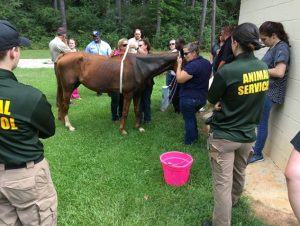 I feel truly blessed to be surrounded by such a wonderful group of professionals who are as passionate about our mission to make a difference. My sincere thanks to you all!
I feel truly blessed to be surrounded by such a wonderful group of professionals who are as passionate about our mission to make a difference. My sincere thanks to you all!
Jessica provided detailed information concerning what she, or any prosecuting attorney needs in order to successfully prepare a case which would insure a conviction. What would be the value in doing all of the work it takes to issue and execute a warrant, prepare a case, and then loose the case or have it dismissed for lack of evidence. While we are saving these animals from abuse, the offender repeats the abuse all over again if not convicted.
In addition to information provided in the training facility, we also provided practice and instruction with live horses outdoors (transported to the event by GDA, Equine Inspectors) to those interested in learning about the nature of horses and effective ways to interact with them. Demonstrations and hands on training was provided in evaluating a horse that has been neglected, how to handle them, their body score and various handling demonstrations. Some of the officers had not had interaction with horses in the past, as this training provided basics to enable them to handle and make better decisions in the welfare of the animal.
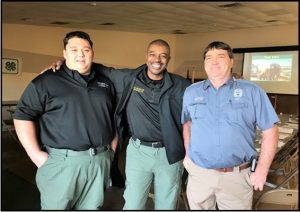 Since 2010, GERL has been hosting what we in GERL land call a “Multi-County Meeting”, a/k/a MCM, when we held our very first law enforcement training meeting. It was at the Golden Corral in Winder and we had invited 10 surrounding counties to attend. We didn’t have a hands-on horse demo, obviously, but we did have a small crowd big enough to fill the private room. We learned that we were going to have to invite a whole lot more than 10 counties if we wanted the program to grow. And grow, it has!
Since 2010, GERL has been hosting what we in GERL land call a “Multi-County Meeting”, a/k/a MCM, when we held our very first law enforcement training meeting. It was at the Golden Corral in Winder and we had invited 10 surrounding counties to attend. We didn’t have a hands-on horse demo, obviously, but we did have a small crowd big enough to fill the private room. We learned that we were going to have to invite a whole lot more than 10 counties if we wanted the program to grow. And grow, it has!
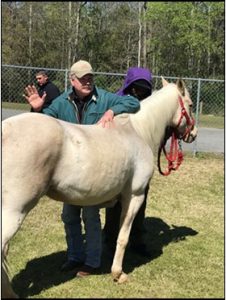 I’m going to attribute most of that to the wonderful team of volunteers that host them. The one who does most of the heavy lifting is our Treasurer, Lynne Robinson. She takes care of sending out all of the invitation letters to all of the animal control and law enforcement agencies within a 2-3 hour driving distance to the facility. She typically will send out over 125 letters. Lynne also serves as GERL’s speaker at every single meeting we host. She’s does a wonderful job of delivering GERL’s message and I couldn’t be more proud. She takes off from her work and drives long distances (Tifton, Jesup, wherever), to attend a MCM and she also makes up all of the training manuals for every attendee, for every meeting.
I’m going to attribute most of that to the wonderful team of volunteers that host them. The one who does most of the heavy lifting is our Treasurer, Lynne Robinson. She takes care of sending out all of the invitation letters to all of the animal control and law enforcement agencies within a 2-3 hour driving distance to the facility. She typically will send out over 125 letters. Lynne also serves as GERL’s speaker at every single meeting we host. She’s does a wonderful job of delivering GERL’s message and I couldn’t be more proud. She takes off from her work and drives long distances (Tifton, Jesup, wherever), to attend a MCM and she also makes up all of the training manuals for every attendee, for every meeting.
Another member of our team is our secretary, Cynthia Anderson, who oversees the registrations. We had 35 people register for the training class in Tifton. Cynthia, meanwhile, is currently doing double-time with her job so, there was quite a bit of activity for her to juggle. Like Lynne, she took off work and drove down to Tifton late at night to be there early the next morning to set up.
The third member of our team is Board member, Linda Kundell. She takes care of all the staple items required to host a meeting: banners, newsletter, extension cords, paper plates, cups, coffee pot, etc. She is dependable and loyal to this program (and GERL, in general). Linda and I usually ride together to attend MCMs since we live relatively close. She reminds me of a wind-up toy. She has amazing energy and passion for what she does, and I really appreciate that.
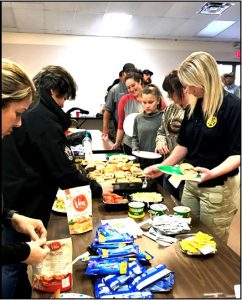 The meeting in Tifton was set up for us by Reginia Wells, the Secretary/Treasurer of the American Animal Control Association. We met Regenia in Jesup back in November and she expressed her desire for us to take our show to her area. It was well-attended and the crowd was genuinely interested in the message. The Georgia Department of Agriculture (GDA), Animal Division, was well represented. Equine Manager, Mat Thompson shared his presentation immediately following Lynne. Equine Superintendent, Corey Cravey, delivered the second portion of the Equine training, before everybody went outside to handle the live horse that Corey had brought.
The meeting in Tifton was set up for us by Reginia Wells, the Secretary/Treasurer of the American Animal Control Association. We met Regenia in Jesup back in November and she expressed her desire for us to take our show to her area. It was well-attended and the crowd was genuinely interested in the message. The Georgia Department of Agriculture (GDA), Animal Division, was well represented. Equine Manager, Mat Thompson shared his presentation immediately following Lynne. Equine Superintendent, Corey Cravey, delivered the second portion of the Equine training, before everybody went outside to handle the live horse that Corey had brought.
We broke for lunch and then Kevin Hearst, DeKalb Co. Animal Services Investigator, entertained the crowd with his informative and mesmerizing presentation. Kevin makes learning fun and relatable. He is a great speaker and teacher and we really appreciate his support to GERL over the past 8 years.
I feel truly blessed to be surrounded by such a wonderful group of professionals who are as passionate about our mission to make a difference. My sincere thanks to you all!
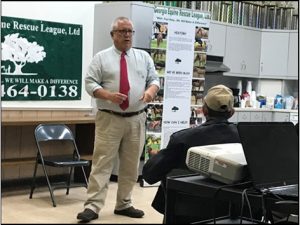 On November 30, 2017, the Georgia Equine Rescue League hosted a training event in Jesup for local law enforcement and animal control. This training was to raise awareness about how to handle equine abuse and neglect cases. I am a biology professor at Georgia Military College in Milledgeville, Georgia, and I attended this training in order to share the knowledge with my Forensic Biotechnology students.
On November 30, 2017, the Georgia Equine Rescue League hosted a training event in Jesup for local law enforcement and animal control. This training was to raise awareness about how to handle equine abuse and neglect cases. I am a biology professor at Georgia Military College in Milledgeville, Georgia, and I attended this training in order to share the knowledge with my Forensic Biotechnology students.
Many topics were covered including regulation changes, handling procedures, and determining the difference between abuse and neglect. While the presentations from various professionals, were well done, I particularly enjoyed the hands-on activities. We were shown how to handle a horse and solved simulated animal abuse cases as groups. I found the information fascinating and useful, and I am looking forward to sharing the information with my students.
Taylor Upole
Assistant Professor of Natural Sciences
Georgia Military College
Milledgeville, GA
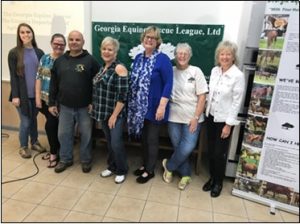
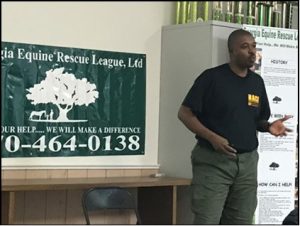
For those who may not know, GERL sponsored “Multi County Meetings” are held several times each year to familiarize local police and animal control personnel with GA Equine Protection Laws and to point out how their everyday investigative and evidence gathering techniques can be molded for effective use in equine cruelty cases to insure successful prosecution of abusers.
The first week of April found our GERL Multi County Meeting Team in Summerville, GA. The team consists of Patty Livingston and Lynne Robinson, GERL Board members, Mat Thompson, Equine Manager for GA Dept. of Agriculture, Kevin Hearst, Field Supervisor/Chief Cruelty Investigator for Dekalb County Animal Services, and Sherwin Figueroa, Asst. District Attorney with the Cobb County Judicial Circuit. They are wonderful speakers and are so anxious to share their knowledge and experience. We must also mention Jesse Murray and Adriane Cook, GDA Equine Inspectors who willingly transport GDA impounded horses, often for long distances, to be used for our “hands on” demonstrations.
GERL has been sponsoring these gatherings since 2011. They are well attended and present an opportunity for the officers to learn of the existence of our organization and how we can help them to deal with the growing “horse problems” in our state. Most importantly, the meetings encourage them to get involved with building cases against abusive equine owners who deserve to be punished. Prosecution of abusers is an important part of the “GERL Get Well Plan” which provides a path to controlling, and eventually ending, cruelty to horses in Georgia………and that is the great hope of GERL.
Interestingly, this MCM was the second in the small town of Summerville. We were very pleased when Josh Powell of the Summerville Police Dept. requested that we do another one in his area so that more area officers could receive the training. To make it even better, Lee Rast, GERL Area Coordinator agreed to prepare lunch and to bring some of her rescue horses for the “hands on” portion of the day. It was the BEST lunch ever served at a Multi County Meeting! She went “above and beyond” all expectations by preparing roast chicken breasts, green beans, mashed potatoes, a luscious salad, and the best brownies ever. Thanks to Josh Powell , Lee Rast, her husband Phil, and our wonderful MCM Team, who made this event another great success.
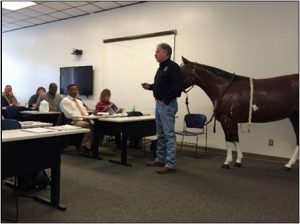 Our GERL President, Patty Livingston, is a very wise lady. It didn’t take long after she took over the leadership of GERL for her to realize that to simply rescue starved and abused horses would never solve the problems caused by overbreeding and lack of consequences for abusers in one of the only states in our country to actually have LAWS to protect equine. Certainly, to identify and do something to help the unfortunate animals that fall into the hands of those who either cannot, or will not properly care for their horses, has long been a major part of our mission. However, it has become clear to GERL that more must be done. Not only must we discourage overbreeding of horses in our state but we must encourage punishment of those who ignore or do not honor Georgia’s equine protection laws. They must face appropriate consequences which includes legal prosecution, stiff fines, having their horses taken away and be forced to pay restitution for rehabilitation of the horses, or even going to jail for their cruel actions.
Our GERL President, Patty Livingston, is a very wise lady. It didn’t take long after she took over the leadership of GERL for her to realize that to simply rescue starved and abused horses would never solve the problems caused by overbreeding and lack of consequences for abusers in one of the only states in our country to actually have LAWS to protect equine. Certainly, to identify and do something to help the unfortunate animals that fall into the hands of those who either cannot, or will not properly care for their horses, has long been a major part of our mission. However, it has become clear to GERL that more must be done. Not only must we discourage overbreeding of horses in our state but we must encourage punishment of those who ignore or do not honor Georgia’s equine protection laws. They must face appropriate consequences which includes legal prosecution, stiff fines, having their horses taken away and be forced to pay restitution for rehabilitation of the horses, or even going to jail for their cruel actions.
To watch the morning news while we drink our coffee on any given day, makes us painfully aware of just how busy are our law enforcement officers. On top of that, they now have to face the fact, as never before, that they may even be in mortal danger while trying to do their jobs. It is understandable that they might feel that to enforce our equine protection laws, must go to the bottom of their list of priorities.
Thankfully, since GERL has been meeting several times each year with law enforcement and animal control officers in an effort to gain their help in our fight against equine abuse, we have never heard that feeling expressed. In fact, I believe those who attend our Multi County Meetings, leave with a new found determination to gladly work equine cruelty cases and see that abusers are punished. For that we give all of the credit to our three outstanding instructors who are tops in their field. Many of the officers have never even been close to a live horse. No wonder they are reluctant to approach a horse found running loose near a busy road. If they are called upon to carry out such a duty, I’m sure the training they receive at our trainings, will help them feel much more at ease.
Thus, for our last Multi County Meeting of 2016, we returned to the Macon Farmers Market Meeting Facility on December 1st. Patty Livingston, Linda Kundell, and I prepared for the meeting and we are grateful to Susie Bond for volunteering to help. There were 28 attendees.
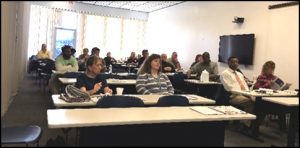 Georgia Dept. of Agriculture, Equine Manager, Mat Thompson actually brings two horses from one of the GDA Equine Impounds so that the officers might learn how to safely and properly approach and halter a horse. Mat demonstrates how to use a weight tape as a way to evaluate equine body condition and even gives a hands on lesson on how to convince a horse to get into a trailer. Each officer has an opportunity to approach the horses and work with them.
Georgia Dept. of Agriculture, Equine Manager, Mat Thompson actually brings two horses from one of the GDA Equine Impounds so that the officers might learn how to safely and properly approach and halter a horse. Mat demonstrates how to use a weight tape as a way to evaluate equine body condition and even gives a hands on lesson on how to convince a horse to get into a trailer. Each officer has an opportunity to approach the horses and work with them.
Investigator Kevin Hearst of DeKalb County Animal Control gives a detailed and most entertaining lecture concerning the care which must be taken any time an officer is required to enter private property, he speaks on the intricacies of effective evidence gathering, and reveals some of the problems officers may face when dealing with dangerous animals and angry animal owners. He gives excellent suggestions on how to diffuse potential volatile situations. Lastly, he presents a lab in which the officers form teams and work together to solve an abuse case from actual evidence gathered during a previous case. This is all very serious but, at the same time, fun and educational for all.
Then it is time for Sherwin Figueroa, Esquire, Asst. D.A., Cobb County to speak. She is an experienced prosecutor, a great speaker, and a true animal lover. She presents details to the officers describing how those who investigate animal abuse cases can best provide the information a prosecutor needs to insure a successful outcome. She loves to see animal abusers get what they deserve and impresses on the class, the importance of the thoroughness of the report she receives from them in order to make that happen. After her lecture, she gives out her business cards to the officers and encourages them to contact her if they have problems getting cooperation from prosecutors or judges in their county concerning animal abuse cases. She is willing to make some calls and be an advocate for the officers. We at GERL feel that is way beyond what might be expected of her and we are grateful.
We are proud of, and grateful for each of our speakers. None of them receive any remuneration for their time or travel. It is simply their genuine concern for animals and their willingness to share their knowledge and experience that causes them to agree to remain a part of our team. They easily hold the interest of our attendees all day and we are certain that, because of them, the officers go home with a much better understanding and acceptance of their role in ending the widespread equine abuse which we face today.
We ask for volunteers from our membership each time we hold one of these meetings. I would encourage our members to come and help out any time you are available. You will greatly enjoy the program and learn so much about the police work involved in animal cruelty cases.
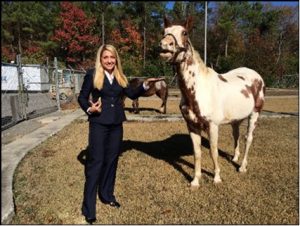
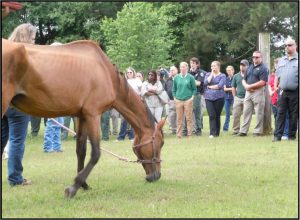 GERL has been holding training seminars with law enforcement and animal control officers for the past several years. Most years we hold at least two such events.
GERL has been holding training seminars with law enforcement and animal control officers for the past several years. Most years we hold at least two such events.
The purpose of the seminars is to call attention to the widespread cruelty and mistreatment of horses in Georgia and to encourage law enforcement officers to become involved in enforcing the Georgia laws which are in place to protect these animals. Granted, police officers are very busy catching “the bad guys” and, in the past, they have rarely found time to concern themselves with animals. The animal control officers have their hands full dealing with dogs, cats, and chicken fighters. Horses have not been a concern to them until recent years. Both of these law enforcement agencies are now receiving more and more calls concerning horses which have been abandoned or horses running loose which can certainly result in tragedy.
Most police and animal control officers are only vaguely familiar with the Georgia 1992 Equine Protection Act. This set of laws was enacted specifically to address the legal responsibility of horse owners to provide humane and adequate care.
In the past, it fell to the Georgia Department of Agriculture, Equine Division to deal with issues concerning equine. Budget cuts and increased reports of equine incidents, make it impossible for them to adequately meet the need. Thus, GERL recognized the need for additional help from the legal community and the concept of the “multi-county meetings” was formed.
From the very beginning, GERL has been quite pleased with the response to our invitations for officers to attend the meetings. We advertise them well in advance and let the officers know that the program will include information about, not only Georgia equine protection laws, but basic horse handling (live horses provided by GDA), and detailed guidelines for impoundment and successful prosecution of offenders.
The program lasts for an entire day and is usually pretty much the same, yet many of the attendees have returned to hear the lectures for a second time. We provide lunch and POST cre
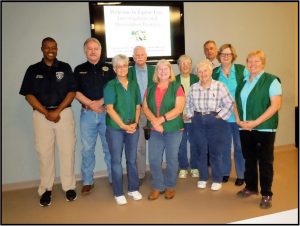
dit hours for those who are required to have a certain number of continuing education credits each year to maintain their “POST certified” status.
On May 18th. of this year, GERL’s Education Director, Sue Vetch hit a “home run” when she was able to secure the Cobb County Safety Village for our first 2016 training. This outstanding facility is located in Marietta, the very hub of the metro law community.
A record eighty attendees were registered! This is by far the largest Multi-County Meeting GERL has sponsored. Some registrants did not show up but there were many others who showed up without being pre-registered so the final number remained near eighty. We were thrilled!
The day flew by and everyone seemed glued to each speaker’s presentation, including those of us who had heard it all before. To top it all off, Channel 5 sent a reporter and cameraman to film the day’s activities and they aired very good coverage of the event several times over the next few days. This is just what we at GERL have been hoping might happen so that the general public might learn about our organization and our efforts on behalf of horses in need. The good people in this world care about animals. It is those who are uncaring and who knowingly abuse animals (especially horses!) that GERL seeks to identify, see that they are punished and/or pay restitution, and that they will never be permitted to own horses again. That is where we hope to go with all of this and we cannot do it without the help of sheriffs, police, and animal control officers. We are delighted to have an opportunity to establish relationships with them, be a part of educating them about our equine protection laws, and encouraging them to join our fight against equine abuse in Georgia.
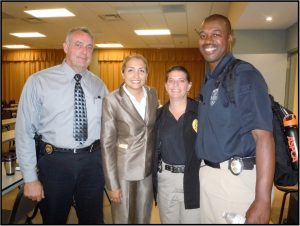 We are fortunate to be able to present three outstanding speakers to provide the training. They are Mat Thompson, GDA Equine Manager, Kevin Hearst, Cruelty Investigator for DeKalb County Animal Control, and Sherwin Figueroa, Esquire, Asst. D.A., from Cobb County. Each speaker imparts, not only their enthusiasm for, but also their extensive knowledge of proper case development which will eventually lead to punishment for those who would abuse any animal.
We are fortunate to be able to present three outstanding speakers to provide the training. They are Mat Thompson, GDA Equine Manager, Kevin Hearst, Cruelty Investigator for DeKalb County Animal Control, and Sherwin Figueroa, Esquire, Asst. D.A., from Cobb County. Each speaker imparts, not only their enthusiasm for, but also their extensive knowledge of proper case development which will eventually lead to punishment for those who would abuse any animal.
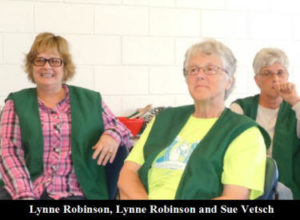 On December 16, 2015, GERL Volunteers gathered at the Macon State Farmers Market to hold another training class on Equine Handling and Cruelty Investigations. We had invited Police and Animal Control Officers from 42 counties. This is the 9th. time GERL has hosted such a meeting. The purpose of the meetings is to educate the officers concerning Georgia’s Equine Protection Laws and to provide training on evidence gathering to prepare for a winning animal abuse court case. We also provide practice with live horses (transported to the event by GDA, Equine Inspectors) to those interested in learning about the nature of horses and effective ways to interact with them. We teach the officers how to catch loose horses, properly halter a horse, and ways to successfully load a horse onto a trailer. Some of the officers have never even been close to a horse and are, understandably, reluctant.
On December 16, 2015, GERL Volunteers gathered at the Macon State Farmers Market to hold another training class on Equine Handling and Cruelty Investigations. We had invited Police and Animal Control Officers from 42 counties. This is the 9th. time GERL has hosted such a meeting. The purpose of the meetings is to educate the officers concerning Georgia’s Equine Protection Laws and to provide training on evidence gathering to prepare for a winning animal abuse court case. We also provide practice with live horses (transported to the event by GDA, Equine Inspectors) to those interested in learning about the nature of horses and effective ways to interact with them. We teach the officers how to catch loose horses, properly halter a horse, and ways to successfully load a horse onto a trailer. Some of the officers have never even been close to a horse and are, understandably, reluctant.
These periodic training classes are sponsored by GERL and GDA, Equine Division as a way to partially fulfill Patty Livingston’s “Get Well Plan” which is a path to solving the problem of too many horses, the result of overbreeding, which Patty believes leads to the neglect and abuse we frequently encounter. Two parts to the plan are (1.) to provide education to law enforcement, animal control agencies, and the community, and (2.) push for prosecution, fines, and punishment of neglectful and abusive owners.
We reached out to Happy Wyatt, Macon Farmer’s Market Manager. She very graciously offered the entire center to us to hold our first training in Macon. Adjacent to the building was the perfect safely fenced, grassy area where the horses involved could be placed for the day. Here Mat Thompson teaches the details of body scoring horses and provides the hands-on instruction mentioned above. GERL is extremely fortunate to have three very knowledgeable and willing instructors for these events. They are Mat Thompson, GDA Equine Manager, Kevin Hearst, Field Supervisor/Chief Cruelty Investigator for Dekalb County Animal Services, and Sherwin Figueroa, Asst. District Attorney with Cobb County Judicial Circuit. Mat Thompson speaks on Georgia Equine Protection Laws and describes what constitutes equine abuse. He also teaches how to body score horses and loves to share his experience in horse handling. He also graciously helps to provide live horses for horse handling practice.
Kevin Hearst never fails to present an information filled and humorous account of his experiences concerning the proper way to carry out and document animal abuse cases. At one point, he passes out actual photographs of some of his past cases to several teams which include all of the attendees. They are 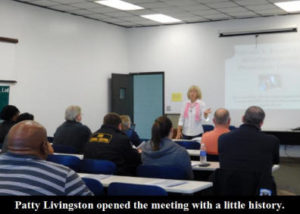 to examine the photographs and give their combined analysis of the pertinent details. They actually did quite well and all seemed to greatly enjoy this exercise.
to examine the photographs and give their combined analysis of the pertinent details. They actually did quite well and all seemed to greatly enjoy this exercise.
Last, but not least, Sherwin Figueroa provides detailed information concerning what she, or any prosecuting attorney, needs to be able to successfully prepare a case which would insure a conviction. After all, what would be the value in doing all of the work it takes to issue and execute a warrent, prepare a case, and then loose the case or have it dismissed for lack of evidence. All three of these speakers are passionate about protecting all animals, through the use of our laws, and making sure offenders are punished. GERL shares that passion. Several GERL Volunteers (Myself, Patty Livingston, Lynne Robinson, Tamma Trump, Anne Ensminger, Cynthia Anderson) provided lunch for all, gave out door prizes to several lucky attendees, passed out weight tapes, class notes, and provided halters and lead ropes to those who wanted to have them in their on-duty vehicles. Each attendee was presented a Certificate of Training and those with the need, were provided six P.O.S.T. Certification Hours.
We were also happy to welcome Cheryl Flannigan (Save the Horses – Cumming, GA) as our guest for the day.
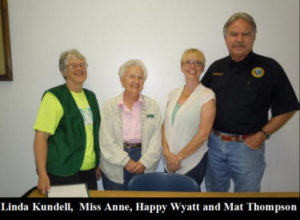
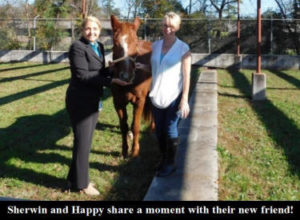
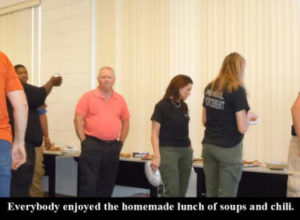
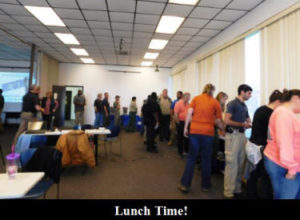
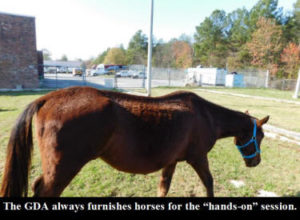
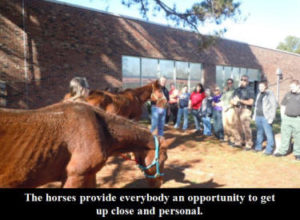
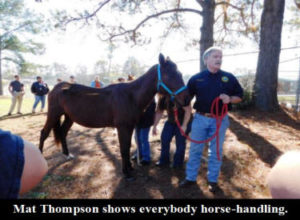
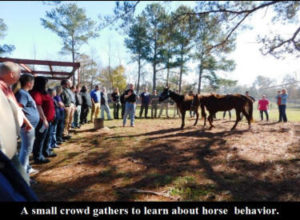
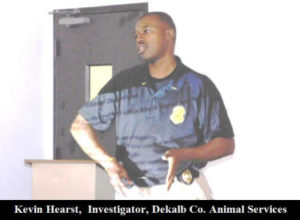
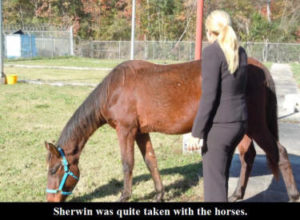
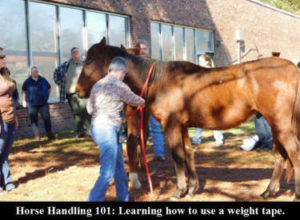
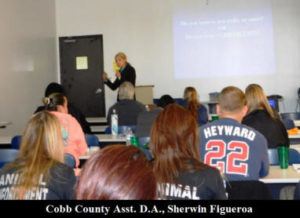

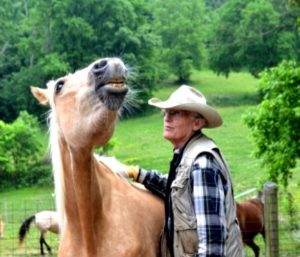 On September 4, 2014 we held one of GERL’s periodic trainings for Law Enforcement and Animal Control Officers. Since I was responsible for organizing the event, I have to say I was nervous. Without the help of Lynne Yates I would not have known what to do. A huge Thank You to her for all of her guidance. Miss Anne took care of the registration and that was also a big help. We were grateful to have over 20 officers in attendance.
On September 4, 2014 we held one of GERL’s periodic trainings for Law Enforcement and Animal Control Officers. Since I was responsible for organizing the event, I have to say I was nervous. Without the help of Lynne Yates I would not have known what to do. A huge Thank You to her for all of her guidance. Miss Anne took care of the registration and that was also a big help. We were grateful to have over 20 officers in attendance.
If you have never seen what goes into one of these presentations you should volunteer and attend the next one in your area. Lynn did a great job with the GERL presentation. She gave a short history of our organization and outlined the programs we provide to help horses in many ways. 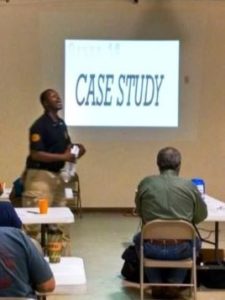 Lynne’s presentation was followed by Mat Thompson, GDA Equine Director. He spoke about the basics of handling and interacting with horses, explained how to body score a horse, and gave an outline of the responsibilities of the GDA Equine Division. Mat did a great job of pointing out why we need more Law Enforcement involvement in equine abuse cases.
Lynne’s presentation was followed by Mat Thompson, GDA Equine Director. He spoke about the basics of handling and interacting with horses, explained how to body score a horse, and gave an outline of the responsibilities of the GDA Equine Division. Mat did a great job of pointing out why we need more Law Enforcement involvement in equine abuse cases.
After his lecture, we all went outside for some hands on work with two horses from the GDA Mansfield Impound. At this point, everyone became even more attentive. GERL had provided all of the officers with weight tapes and part of Mat’s demonstration included instructions about how they are used. It was easy to see that many of the officers had not been that close to a horse before. Many began asking questions once they were around the horses. Many of the officers were given donated halters and lead ropes in the event that they encounter a loose horse. We are very grateful to Tractor Supply in Monroe for donating several new lead ropes. When everyone had taken a turn practicing haltering, weight taping, and body scoring, it was then time for lunch.
The volunteers had prepared some awesome food. Linda Kundell brought Black Bean Soup and Brownies. Anne Ensminger brought Vegetable Soup and Crackers. Cynthia Anderson brought a great salad. We had Lemonade donated by Chick Fill A in Monroe. My daughter, Danielle and I brought the breakfast food. Rose Williams helped us out as well.
After lunch Kevin Hearst who is a Field Supervisor/Chief Cruelty Investigator for DeKalb County spoke. Let me tell you no one was sleeping during his presentation! He knows his stuff. He did a great job of detailing how to investigate and collect evidence for abuse cases in order to insure successful prosecution.
The final speaker was Ms. Sherwin Figueroa. She is an Asst. District Attorney for Cobb County. Sherwin is an outstanding speaker and is all about prosecuting abusers. She informed the officers how they can help their District Attorney’s Office prepare successful cases against abusers by thorough documentation including photographs, and protecting evidence. She let it be known that she is willing to share her vast experience dealing with abuse cases with any law enforcement agency or District Attorney’s office in Georgia.
All I could say was WOW at the end of the day. I am proud to have accepted the job of GERL Education Director. It is GERL’s goal to sponsor three Multi County Meetings per year. I look forward to being involved with the next one. I cannot overstate the importance of our volunteers. I can’t imagine such an undertaking without them. I also want to thank the Walton County Extension Office for letting us use the Walton County Agricultural Center near Monroe for our meeting.
Once 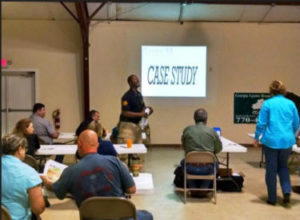 again thanks to everyone that helped and I pray I did not forget to mention someone. If you are interested in helping to put one of these meetings together in your area give me a call so we can decide on the dates and make sure all of our speakers are available.
again thanks to everyone that helped and I pray I did not forget to mention someone. If you are interested in helping to put one of these meetings together in your area give me a call so we can decide on the dates and make sure all of our speakers are available.
You might remember that, for me, the most important element in Monty Roberts’ Join Up is that the choice to join up, to trust, belongs to the horse. It is not forced by the human. And when the horse makes that choice freely, of its own free will, everything changes. No-Agenda Time takes longer than Monty’s Join Up (which usually works for him in 30 to 40 minutes). Our No Agenda experiment with our new mustang Saffron took 35 days, but when it happened everything changed, like a flash, right before our eyes. Everything! As if she had just flicked a switch.
When we adopted her she had never willingly touched or been touched by any human. She would eat hay near my feet so long as I was sitting down, but if I stood up she was gone. And if I dared to attempt to touch her she was gone. And she came to us pregnant with a baby conceived in the wild. Before we picked her up we had already decided to do absolutely nothing with her until, by her own choice, she had accepted us. Until she had told us very clearly that she trusted us. We began No Agenda Time on her second evening here. We chose No Agenda Time because I believe that the more fearful the horse, or the more abused the horse has been in the past, and/or the less experienced the owners (us), the better it is to have less contact and thereby less chance to make a mistake. Also I’m lazy and No Agenda Time is definitely the lazy person’s Join Up.
Had we introduced our first mustang, Noelle, to No Agenda Time right at the beginning and made no moves to attempt anything with her that could even possibly evoke a fear response until well after she had, of her own free will, committed to trust us, I believe things would’ve been very different with her. But No Agenda Time had not entered our imagination at that time. And I made mistakes with her that caused fear, lots of it, and cost us years.
What we didn’t know then is that every fear of human is caused by a human. The current human, or some past human. Somewhere. At some time. And therefore can be associated with all humans. (See Born Wild – Chapter 29).
Have you ever wondered what it would be like to meet a horse who had never seen a human before? Never been roped and jerked and pulled around by one. Never been physically forced to do things it didn’t want to do. Or was afraid to do. Never been frightened out of its wits by a human. Or chased by screeching men on other horses. Or poked, kicked, and whipped. Or electric shocked into submission. Kelly Marks wondered. And she set out to find such a horse.
What she found in Namibia were wild horses who had no reason to believe they should be afraid of the humans they encountered because they had never encountered one. And as 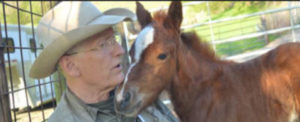 long as Kelly and her team never once did anything that even approached causing the horses to be afraid, they were never afraid. Never reactive. Kelly could rub them anywhere, even in their ears. And teach them. And ride them! (See the documentary: http://vimeo.com/33062665)
long as Kelly and her team never once did anything that even approached causing the horses to be afraid, they were never afraid. Never reactive. Kelly could rub them anywhere, even in their ears. And teach them. And ride them! (See the documentary: http://vimeo.com/33062665)
That is simply the best lesson ever! Do not ever do anything that could cause your horse to be afraid of you. Unfortunately we didn’t understand this when our Noelle arrived. Still she taught us a huge lesson. She taught us about No Agenda Time. We just didn’t realize it at the moment. Without the history with Noelle, exactly as it happened, Saffron would never have experienced No Agenda Time. Nor would she be where she is today.
Firestorm was born three days after Saffron arrived and we were already doing No Agenda Time. Every evening we sat in folding chairs in the paddock with mama and her new baby… and completely ignored mama. There was always a great deal of contact and imprinting going on with the baby, but no contact with mama at all. We placed hay close to our chairs and Saffron would munch it with very few apparent worries.
I beli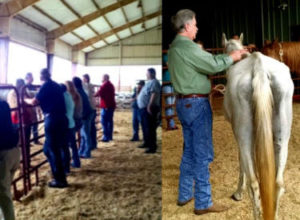 eve that No Agenda Time is best accomplished sitting down, for several reasons. You are less threatening seated than you are when standing. Staying seated naturally restricts your mobility, thus your activity. The less you move around, the less threatening you are. And the less mobile you are the better the chance that you will not look at the horse, or attempt to touch the horse.
eve that No Agenda Time is best accomplished sitting down, for several reasons. You are less threatening seated than you are when standing. Staying seated naturally restricts your mobility, thus your activity. The less you move around, the less threatening you are. And the less mobile you are the better the chance that you will not look at the horse, or attempt to touch the horse.
Obviously the horse must be at liberty. A lead line compromises her free will to choose. And No Agenda Time should be with only one horse at a time (unless it’s a mama and baby 🙂 Placing good hay nearby, hay that the horse really likes, causes the horse to draw closer than she might otherwise do, and the closer she is with nothing bad happening, the more she will relax and begin to believe that you are a safe haven. We do not use alfalfa in our regular feeding regimen because, in quantity, it is not good for any horse. But they love it and it’s different than their regular grass hay so we use it in small quantities for occasional treats, like a condiment, or as an enticement in an emergency when we need a horse to move somewhere quickly, and we use it in No Agenda Time.
With Saffron we started the alfalfa placed maybe six feet away from us. When she got comfortable with that we’d creep it closer, to maybe five feet away. Then over time we’d move it even closer until it was eventually only a couple of feet away. All the while completely ignoring her, showing her no interest and making no contact whatsoever. She grew more and more comfortable.
No Agenda Time can be accomplished with only one person and a good book, maybe ear buds and some good music, or maybe doing homework… but I definitely prefer it with two people in conversation. That seems to emphasize the fact that the horse is being ignored. Left out. It’s one thing to be buried in a book and quite another to be chatting, laughing, and not even trying to include the horse, and I believe at some level that resonates. It might sound weird but I believe the horse reaches a point of wanting to be included. And, too, Kathleen and I are our own best friends and we really enjoy being down in the paddock with a couple of small jelly jars of wine catching up on each others’ day.
No Agenda Time proved to be one of the very best things that could’ve happened to our relationship with Saffron. On various occasions, she reached up and sniffed both of my knees… and my gloves… and more than once asked for a breath exchange.
I sniffed back but understood that she was just exploring. It’s important to know that there was nothing in that desire to sniff that said I’m ready to trust you forever. She had not yet made that choice. She was working her way in the right direction, but only building through baby steps. I made no attempt to engage her in any way and merely continued my conversation with Kathleen. In other words I was leaving it completely up to her. Rather than make a mistake I chose to make no move whatsoever until she almost literally grabbed me by the shoulders and screeched Okay, already!!! I’m in!!!
In other words, please do not jump the gun. Make your horse say it loud and clear.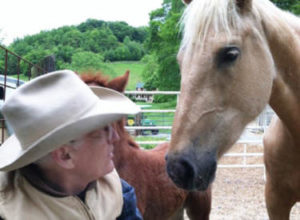 There was a time, not too long ago, when I could not have resisted trying to push the envelope. Reaching out, trying to touch her. Forcing myself on her. But I sat on my hands, figuratively speaking. Because the moment of Join Up had not yet occurred.
There was a time, not too long ago, when I could not have resisted trying to push the envelope. Reaching out, trying to touch her. Forcing myself on her. But I sat on my hands, figuratively speaking. Because the moment of Join Up had not yet occurred.
It wasn’t easy. I know I tend to say some things over and over but this is so important. Relationship First continues to be the key. And the relationship is not set until the horse makes the choice, of her own free will, to say I trust you to be my leader. And that’s when everything changes for the better. How long will No Agenda Time take?
When we started with Saffron we committed to take whatever time it takes. And, for it to work, you must make that kind of commitment. The horse, its history, you, the paddock all are involved in how long it takes. I know friends who have accomplished this type of Join Up in a month by just sitting alone in the middle of a pen, studying for college classes. Once a day, maybe an hour a day. And then there’s our Noelle who has already taken much longer than a month, but she has so much to overcome, and she is making progress.
On a recent evening it was all was quiet and nice until Noelle caught the rim of the tub with her lip and it lifted maybe two inches off the ground. Before the sound of the tub’s plop back onto the pea gravel had dissipated Noelle was halfway across the pen.
We hope we can recapture what we had with her before the move to Tennessee, and take it further. But it will be on her time, not ours. By her choice, not ours. Meanwhile we are thanking God daily for Saffron. And Miss Firestorm. And that very special surprise on the evening of my birthday. D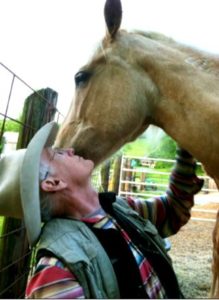 ay #35.
ay #35.
We settled into our chairs in the paddock in front of the barn for our ritual No Agenda Time. Baby Stormy, now one day shy of a month old, came right up for a rub and a sniff and promptly dropped onto Kathleen’s feet for a nap. That, too, was becoming ritual. Miss Saffron was munching hay near our feet, appearing even less concerned than usual about being close to us.
I was doing my best to ignore her, which, remember, is what No Agenda Time is all about. But every once in a while, when she would get really close, I’d use that as an excuse to break the rule. “She wants me to touch her,” I might plead. “I can feel it.” “You know the rules,” Kathleen would say.
Two fingers onto her cheek for little more than a second was the best I had ever done. Only once. If pressed, she would walk away. If I stood up she would walk away.
We usually use Monty Roberts’ Join Up to begin relationship. But the good things that occurred when we spent this sort of time with Noelle after her Malachi’s death encouraged us to try it with Miss Saffron. We’d been at it for a month, sitting in the same place every night, since the day Stormy was born, which was three days after Saffron arrived; and we had promised ourselves that once started we would pay no attention to time. We would take whatever time it took.
We hadn’t been sitting long on this birthday evening when there was a crunch behind me on the pea gravel covering the paddock. A close crunch. I glanced up at Kathleen. “Is she close?” Kathleen’s eyes were widening. She nodded. “Very.”
My heart was skipping beats. I wanted so to turn and see. Kathleen was easing her iPhone out of its holster. And suddenly there was this marvelous tickle. Whiskers on my neck. And a warm breath in my ear. Then a rub, cheek to cheek so to speak.
I was frozen in place for a long moment. I didn’t want to blow it. Finally I couldn’t resist. I turned slowly… and kissed her on the nose. Then reached around and scratched the off side of her face. “Hello Miss Saffron,” I said softly. “Welcome home.”
She blinked. And blew me a long slow breath. I returned it. Kathleen’s phone camera was clicking away. “Happy birthday,” she said. “I told her it was today.”
My hand began to sneak up her face to the top of her head, sliding over to scratch the base of her ear. A thumb slid inside and rubbed and rubbed. Miss Saffron purred.
I didn’t know what to think. The best progress I had ever had with any of our horses was incremental. A little at a time. Even now, four years after Noelle came to us, I could barely touch her ears. And only then on some days. I wondered if I should attempt to stand up. My hand slid down 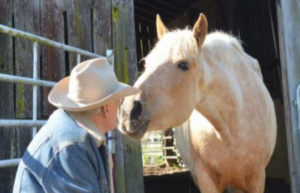 her neck, rubbing and scratching as it went. I felt like a school kid on my first date, trying to sneak my hand onto her shoulder. I scratched back up her neck and eased into a standing position as I went. Saffy took no notice. Suddenly I hit a sweet spot and she responded in ecstasy, stretching, reaching for the sky.
her neck, rubbing and scratching as it went. I felt like a school kid on my first date, trying to sneak my hand onto her shoulder. I scratched back up her neck and eased into a standing position as I went. Saffy took no notice. Suddenly I hit a sweet spot and she responded in ecstasy, stretching, reaching for the sky.
Yes please! More, more! I scratched all the way down her back to her tail bone, slid down her hip, and underneath to her tummy and her belly button, then back forward, and down her front leg to her hoof. I was tempted to lift it, but probably chose wisely not to. This was enough for the moment. Leave it all positive.
Dropping back into the chair I turned to Kathleen with my mouth gaping open. Saffy rested her chin on my shoulder and actually dozed off. “I’ve never seen anything like this,” I said. “A few moments ago I couldn’t touch her. And suddenly… like she just flipped a switch… she’s in.’” “All in,” Kathleen grinned. “Like I said. Happy birthday.”
That’s the day we discovered with Miss Saffron that negative marks on a slate from previous humans can be erased. Wiped clean. It just takes time. We allowed Saffron to take the time that she needed to clean her own slate and when she was done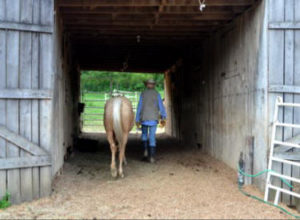 , like the wild horses Kelly Marks found in Namibia, she was able to experience trust without fear.
, like the wild horses Kelly Marks found in Namibia, she was able to experience trust without fear.
Which is why we spent that 35 days doing absolutely nothing with Miss Saffron except to feed her, and be available. And, for 32 of those days, be sweet and loving to her new baby.
How do you know which method to use? A traditional Monty Roberts Join Up? Pat Parelli’s method? Or No Agenda Time? I would say if you know that the horse has had some bad experiences with humans who came before you, I would use No Agenda Time. If you know the horse has had good experiences with previous humans and is familiar with halters, maybe even has been ridden, perhaps try the traditional Join Up. With any mustang – my opinion only – I would use No Agenda Time. Had we known when Noelle came to us what we know today, and had we used No Agenda Time back then, I believe things would be very different today.
Try it. But let the horse make the choices. Don’t be an opportunist. Let it roll along like a family conversation and ultimately the horse will begin to feel very safe and trusting, and one day that switch will flick on and everything will be different. In an instant. And how terrific that feels.
As I write this, we are back at it with Noelle. Take two. We will report.Oh, and once the relationship is in place, of the horse’s choice, once she has said I trust you to be my leader, then you must be a good leader. See Leadership Second.
The highly acclaimed best selling sequel to the National Best Seller. The Soul of a Horse – Life Lessons from the Herd You can see more of Joe Camp’s blogs by visiting http://www.thesoulofahorse.com
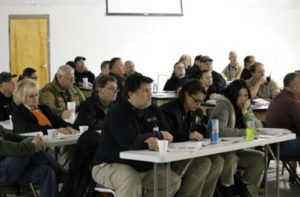 The Georgia Equine Rescue League (GERL) started hosting law enforcement training meetings about three years ago. The meetings are to train law enforcement officers in various aspects of handling equine cases. It is part of a “get well” plan that Patty Livingston, President of GERL, wrote to outline the steps needed to solve the problem of equine neglect and abuse in Georgia.
The Georgia Equine Rescue League (GERL) started hosting law enforcement training meetings about three years ago. The meetings are to train law enforcement officers in various aspects of handling equine cases. It is part of a “get well” plan that Patty Livingston, President of GERL, wrote to outline the steps needed to solve the problem of equine neglect and abuse in Georgia.
There are five parts to the plan:
The last two points listed above are the reason why GERL believes these law enforcement training sessions are so important. It is GERL’s belief that owners must be held accountable for neglectful and abusive behavior.
We had conducted a meeting in September and did not have another meeting planned when Patty received a call from Sgt. Powell in Chattooga County. He had not been able to attend the meeting in September and he really wanted to get his staff trained to be able to respond to calls related to equine in his county. Sheriff Schrader was very supportive of helping GERL host another meeting as soon as possible. We have never received a call from anyone in law enforcement requesting a meeting so we took that as a sign that our hard work for three years was starting to bear fruit. Before long, the date was set and the planning was in full swing. Sgt. Powell found the perfect location in Summerville. The meeting would be held at the county Agriculture Building. GERL Area Coordinator, Lee Rast, drove to Summerville and inspected the location and reported that it would meet our needs perfectly. We had two conference calls to make plans, mailed out 60 letters of invitation to 30 counties (1 for Animal Control and 1 for Sheriff’s office), and then crossed our fingers and hoped for the best.
By the morning of February 27th, we felt sure that our meeting would be well attended. We had over 50 officers from a dozen counties pre-registered. We actually had 43 officers attend the training.
That morning, the dedicated GERL volunteers arrived to get ever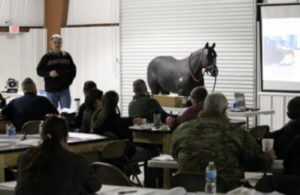 ything ready. Annette Raybon picked up the breakfast goodies from Michelle Meyn, the owner of Bumble Bee Bakery. Michelle is the sister of our Foster/Adoption Coordinator, CeCe Calli. Michelle donated all the breakfast items and we cannot thank her enough. She recently opened her bakery at 1948 Hiram Douglas Highway in Hiram, GA. If you are in her area, drop by and thank her for her support of GERL. She can be reached at 770-485-2164 or thebumblebeebakers@yahoo.com
ything ready. Annette Raybon picked up the breakfast goodies from Michelle Meyn, the owner of Bumble Bee Bakery. Michelle is the sister of our Foster/Adoption Coordinator, CeCe Calli. Michelle donated all the breakfast items and we cannot thank her enough. She recently opened her bakery at 1948 Hiram Douglas Highway in Hiram, GA. If you are in her area, drop by and thank her for her support of GERL. She can be reached at 770-485-2164 or thebumblebeebakers@yahoo.com
We had several volunteers who came out to help us. Lee Rast took the lead to meet with Sgt Powell for the location planning. She also brought chili and cornbread for lunch and kept the food preparation and serving running smoothly. Ray Ziebell brought all the coffee supplies and had the coffee perking in no time. John Absalon was there to help get the chairs and tables in order and the handouts in place. Phil Rast was in charge of the camera and I thank him for the pictures. We could not hold this meeting without Anne Ensminger who handled registration and the preparation of certificates. There were other volunteers who could not attend the meeting but helped with the planning: Cathy Spivey, Rita Benfield, Debbie Whitfield, Joan Hall and Patty Livingston. This was the first law enforcement meeting that Patty missed but she was certainly there in spirit. Cathy Spivey donated one of the $25 gift cards to be given away as a door prize and Anne Ensminger donated two of them. My thanks to Cathy and Anne for their generosity.
I started the meeting with a presentation about GERL. Next up was Mat Thompson, Equine Manager of the Georgia Department of Agriculture. He gave a presentation about equine laws, horse handling and body scoring in addition to information about past cases handled by the GDA. Kevin Hearst was the final speaker before lunch. Kevin is the Field Supervisor/Chief Cruelty Investigator for Dekalb Animal Services and Enforcement. Kevin spoke about the details of investigating an animal cruelty case. Kevin speaks nationwide on the subject and GERL is lucky to have his support. Aft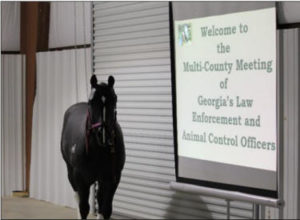 er lunch, the officers received some hands-on experience with real live horses under the tutelage of Mat Thompson and field investigators Adriane Cook and Jessie Murray. The final speaker of the day was Sherwin Figueroa, Asst. District Attorney with Cobb Judicial Circuit. She spoke about building a case for a winning prosecution. I think the officers were very interested in hearing about the prosecution of equine cases from the solicitor’s point of view.
er lunch, the officers received some hands-on experience with real live horses under the tutelage of Mat Thompson and field investigators Adriane Cook and Jessie Murray. The final speaker of the day was Sherwin Figueroa, Asst. District Attorney with Cobb Judicial Circuit. She spoke about building a case for a winning prosecution. I think the officers were very interested in hearing about the prosecution of equine cases from the solicitor’s point of view.
GERL would like to thank all the volunteers, speakers and attendees who made the meeting a success. We would especially like to thank Sgt. Powell and Sheriff Schrader for their support. Hopefully, each officer will take what they learned back to their respective counties. Perhaps they will be more willing to seek prosecution in cases of equine abuse and neglect.
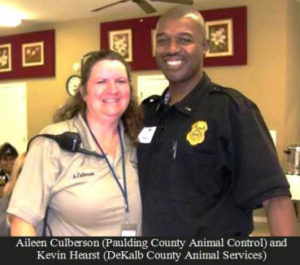 I was happy when my offer was accepted to organize a multi county meeting where GERL has the opportunity to introduce local law enforcement and animal control officers to our mission and find ways that we can work together. I knew it was a formidable undertaking but I knew I had the help of my friends Charlene Baldwin, Cathy Spivey, and Annette Raybon so I never worried one minute.
I was happy when my offer was accepted to organize a multi county meeting where GERL has the opportunity to introduce local law enforcement and animal control officers to our mission and find ways that we can work together. I knew it was a formidable undertaking but I knew I had the help of my friends Charlene Baldwin, Cathy Spivey, and Annette Raybon so I never worried one minute.
It all began with letters of invitation to Police, Sheriff, and Animal Control organizations from twenty north Georgia counties. These invitations were followed up by a reminder letter and then a telephone call. Meanwhile, Annette Raybon was securing the perfect place for us to hold our meeting which turned out to be Sara Babb Park near Dallas, GA. Yes, lots of work but it was well worth our efforts.
When the plans were all completed and the invitations mailed, we were all thrilled as the registrations began to come in. After all was said and done, we had 46 officers signed up to attend. We were told that was a record high number!
The meeting took place on September 6th. GERL President, Patty Livingston welcomed the attendees and gave a history of GERL and explanation of our mission. Then there was an interesting lecture on the equine protection laws in Georgia and a demonstration on basic horse handling and equine body scoring by Mat Thompson, GDA Equine Manager. He used live horses brought in by GDA Inspectors, Jesse Murray and Adriane Cook who assisted with the demonstrations. Next a very entertaining talk concerning the proper way to gather evidence for an animal abuse case in order to ensure successful prosecution by Kevin Hearst, DeKalb County Animal Control Supervisor was presented. This was followed by an excellent lecture on the importance of careful and non disputable evidence gathering to allow for successful prosecution of anyone who would abuse animals. This lecture was given by Sherwin Figueroa, Esquire, As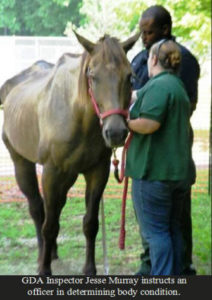 sistant District Attorney from Cobb County. She stressed the fact that no prosecutor can be successful in obtaining convictions without good evidence gathering by investigators in the field.
sistant District Attorney from Cobb County. She stressed the fact that no prosecutor can be successful in obtaining convictions without good evidence gathering by investigators in the field.
A very special guest, Dr. James Sutton, Director of Operations for Georgia Department of Agriculture, was in attendance for the entire day. Realizing that Dr. Sutton was there to familiarize himself with GERL and this very important program, we did not ask him to speak but we hope he will be willing to do that in the future.
GERL provided coffee and sweet rolls in the morning and a nice lunch from Chick-fil-A at noon. Door prizes were given and many of the officers took home halters and lead ropes to keep in their patrol cars “just in case”. Everyone paid close attention to all of the lectures as they are beginning to realize that they are more and more often called upon to intervene on behalf of horses and other large animals in the course of carrying out their duties.
The meeting was a HUGE success by anyone’s standards. In addition to my helpers mentioned above, I would like to thank Patty Livingston, Linda Kundell, Tamma Trump, Lynn Yates, and Anne Ensminger from GERL who were there to lend a hand as well as Ashlee Messer who took a day off from school to represent the Paulding County 4 H Horse and Pony Club. Not only did Ashlee work very hard to help but she, acting as a representative of the Paulding County Saddle Club, presented a nice check from them to GERL. We want to thank Sara Babb Park or allowing us to use their wonderful facility at no charge and the Dallas Chick-fil-A store for providing lunch for all, at their cost.
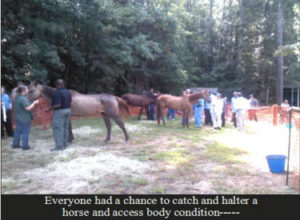
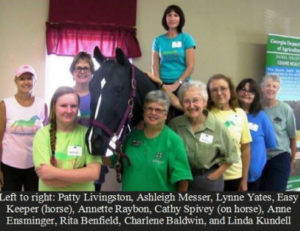
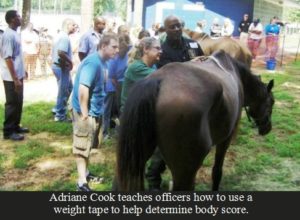
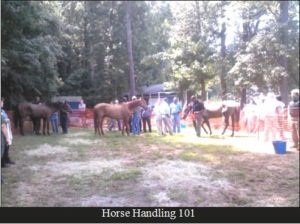
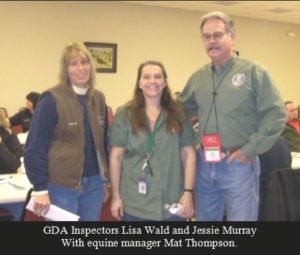 “Appoint a day and it will surely arrive.” That is a Whitworth family saying and the time for our Region 4 (and surrounding counties) meeting finally arrived on Feb. 21, 2013. Much preparation and time by many individuals had gone into the final outcome of thirty-one law enforcement and animal control officers from 13 counties participating in five hours of equine training which included learning about the Georgia Equine Rescue League and its role in helping the horses in Georgia from the president, Patty Livingston. Mat Thompson, the Equine Manager for the Ga. Dept. of Agriculture reviewed his department’s role in answering equine abuse calls, went through the Henneke model for equine body scoring and conducted hands-on demonstrations of how to handle horses. Mat was assisted by two GDA inspectors, Lisa Wald and Jessie Murray in a lovely indoor arena.
“Appoint a day and it will surely arrive.” That is a Whitworth family saying and the time for our Region 4 (and surrounding counties) meeting finally arrived on Feb. 21, 2013. Much preparation and time by many individuals had gone into the final outcome of thirty-one law enforcement and animal control officers from 13 counties participating in five hours of equine training which included learning about the Georgia Equine Rescue League and its role in helping the horses in Georgia from the president, Patty Livingston. Mat Thompson, the Equine Manager for the Ga. Dept. of Agriculture reviewed his department’s role in answering equine abuse calls, went through the Henneke model for equine body scoring and conducted hands-on demonstrations of how to handle horses. Mat was assisted by two GDA inspectors, Lisa Wald and Jessie Murray in a lovely indoor arena.
This training had originally been scheduled in another facility and had to be relocated to the Oglethorpe County Cooperative Extension Service’s Agriculture Center in Crawford, GA just 6 days prior to the meeting. However, the change was “all for the better” because the ag center was a fantastic place for our meeting. We served lunch using a very nice kitchen with an ice maker and other amenities. The participants (45, including the GERL members, GDA & training attendees) seemed to enjoy the selections of homemade soups, breads, and deserts. Thanks go to Linda Kundell and Debbie Whitworth for providing lunch, with much help from a multitude of GERL members that “set up and packed up”.
After lunch, while anxiously awaiting the arrival of 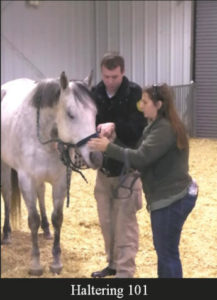 Kevin Hearst, Animal Cruelty Investigator for Dekalb County Animal Services, Patty Livingston tried to recall as much of Kevin’s presentation as possible since we could not reach Kevin and had no idea if he would arrive. Finally he burst on the scene and made his usual energetic and amusing presentation of how to document and prosecute animal abusers.
Kevin Hearst, Animal Cruelty Investigator for Dekalb County Animal Services, Patty Livingston tried to recall as much of Kevin’s presentation as possible since we could not reach Kevin and had no idea if he would arrive. Finally he burst on the scene and made his usual energetic and amusing presentation of how to document and prosecute animal abusers.
All of the attendees received attractive certificates done by our own Anne Ensminger, secretary of GERL and those that required received five POST credit hours. As organizer, I would like to thank all of the ACs, board members and others that helped to contact as many law enforcement and animal control officers as possible with the result of a very productive day.
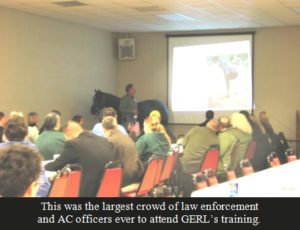
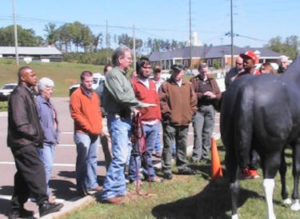 On April 12, officials from ten counties met at the Pickens County Sheriff’s Office in Jasper, Georgia to attend an Equine Training for Law Enforcement and Animal Control. GERL president Patty Livingston began the meeting by introducing the agenda and our speakers.
On April 12, officials from ten counties met at the Pickens County Sheriff’s Office in Jasper, Georgia to attend an Equine Training for Law Enforcement and Animal Control. GERL president Patty Livingston began the meeting by introducing the agenda and our speakers.
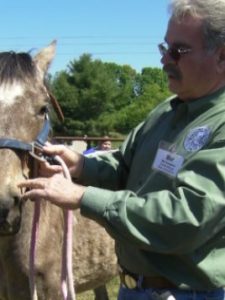 Mat Thompson, the Equine Manager for the Georgia Department of Agriculture, began our day by reviewing the Henneke Model for equine body evaluation. His presentation was augmented by photos of “Charlotte” who came to the attention of the GDA with a Henneke score of 1. She has now been rehabilitated to at least a 2 on the scale thanks to intense efforts by the staff of the GDA.
Mat Thompson, the Equine Manager for the Georgia Department of Agriculture, began our day by reviewing the Henneke Model for equine body evaluation. His presentation was augmented by photos of “Charlotte” who came to the attention of the GDA with a Henneke score of 1. She has now been rehabilitated to at least a 2 on the scale thanks to intense efforts by the staff of the GDA.
“Hands on” demonstrations were conducted outside in order to reinforce Mat’s lecture on measuring and evaluating equine. Derrick Lawrence of the Cherokee County Animal Control Division performed a return demonstration on the life-size model of a horse provided by the GDA. Two live horses were also available for participants to use as we learned proper methods for leading and loading horses, evaluating age by evaluation of the teeth, noting markings, and haltering and maneuvering.
At this point, lunch was served and it would be remiss not to note here what a wonderful lunch it was!! Special thanks go to Linda Magness (Lakota Cove Custom Rustic Furnishings, of Jasper, GA), Alan and 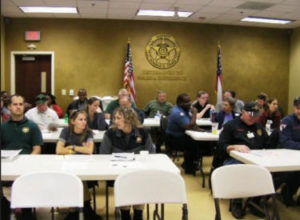 Angie Darnell of Milton, GA, Cherokee Feed and Seed of Ball Ground, GA, and Lynne Yates, AC for Bartow, Cherokee, Cobb, Douglas, Paulding and Fulton Counties.
Angie Darnell of Milton, GA, Cherokee Feed and Seed of Ball Ground, GA, and Lynne Yates, AC for Bartow, Cherokee, Cobb, Douglas, Paulding and Fulton Counties.
I think that all will agree that a full meal can make one lethargic. It isn’t unusual to see folks dozing in afternoon lectures. Well, none of our participants could drift off under the control of our afternoon speaker, Kevin Hearst. In his day job, Kevin is an Animal Cruelty Investigator for DeKalb County Animal Services. If he has an evening job, I’m sure it must be as a stand up comic (or it should be!!) Kevin made a very unpleasant subject more palatable by his energetic and amusing presentation.
An important point for GERL members as well as law enforcement that Kevin stressed is the accuracy of documentation in equine cruelty investigations. Photos must have three copies and be dated. Further, in order to use photography evidence, it must paint an accurate picture of the entire situation. Not only should there be front, side, top and rear views of the animal in question, there should also be documentation of the living conditions, the owner’s property, the street and the mailbox of the owner (verifying address). And it is essential not to violate the owner’s fourth amendment rights.
After a brief recess, Kevin continued his presentation by allowing participants to divide into groups for their own “investigations” of three case studies. Each group had several photos from which to gain their “evidence”. Group evaluations gave attendees every opportunity to remember and use earlier lessons and then to report their suppositions to the group at large.
At the end of the day, certificates were presented to attendees for 5 hours of continuing education.
GERL wishes to extend special thanks to Ray Ziebell for organizing this informative and fun day and to the GERL volunteers who assisted.
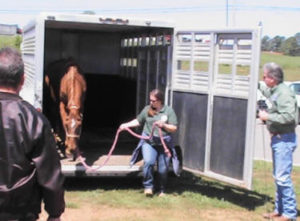
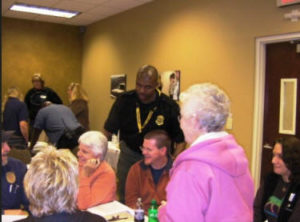
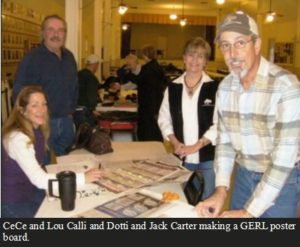 As sometimes happens with GERL events, the 2012 Annual Meeting took place on about the worst day, weather wise, of the year. Dawn broke on January 21st. to discouraging weather reports of rain and possible severe thunder storms. Indeed, that is just how it went for the entire day. Still, amazingly, we had an excellent turnout for our meeting. There were some who came to learn more about GERL and ended up becoming members. There were also some who drove long distances to attend. Annette Raybon and two of her Paulding County Horse and Pony Club members, Taylor Brock, and Ashleigh Messer presented a donation of $144 to GERL from their club.
As sometimes happens with GERL events, the 2012 Annual Meeting took place on about the worst day, weather wise, of the year. Dawn broke on January 21st. to discouraging weather reports of rain and possible severe thunder storms. Indeed, that is just how it went for the entire day. Still, amazingly, we had an excellent turnout for our meeting. There were some who came to learn more about GERL and ended up becoming members. There were also some who drove long distances to attend. Annette Raybon and two of her Paulding County Horse and Pony Club members, Taylor Brock, and Ashleigh Messer presented a donation of $144 to GERL from their club.
This time, the Annual Meeting was held at the Lion’s Club Building in Winder. The Lion’s Club provides much more space than the restaurants where we met in the past and we don’t have to be in a hurry to leave to make room for another group. The one drawback of the new location is that we do not have the luxury of food being available for purchase. We decided to ask everyone to bring something for a “pot luck” lunch and that turned out to be a great success.
GERL President, Patty Livingston gave an overview of the activities of the previous year and presented plans for the coming year. Patty informed our members that we had more horses in foster care last year than ever. At one time, we had near 50 horses in our program. Our wonderful Foster Coordinator, Becky Gregory, somehow managed to find enough homes for that many horses and over several months, Adoption Coordinator, Ruth Wilson managed to work her magic and place all but about 15 into new homes.
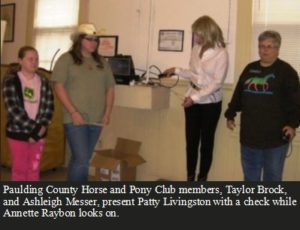 Treasurer, Diana Kelsey, gave a financial report which revealed that, thanks to the hard work of our members and the generosity of many who join us in our concern for the welfare of horses, GERL is financially sound and anxious to continue our fight to end abuse of horses in our state. Diana let us know that we will continue to be able to hold periodic vaccination clinics and encourage the castration of as many stallions as possible by paying a portion of the cost of the surgery for any stallion.
Treasurer, Diana Kelsey, gave a financial report which revealed that, thanks to the hard work of our members and the generosity of many who join us in our concern for the welfare of horses, GERL is financially sound and anxious to continue our fight to end abuse of horses in our state. Diana let us know that we will continue to be able to hold periodic vaccination clinics and encourage the castration of as many stallions as possible by paying a portion of the cost of the surgery for any stallion.
After lunch, we were treated to a very informative and interesting talk by Alan Cassidy of Georgia Safe Trails. Alan, his wife, and some of his fellow law enforcement friends, have developed a wonderful program to teach people how to insure the best outcome when they find themselves in dangerous situations. While Alan’s teaching was directed toward trail riders, his advice would be useful in many instances. He stressed awareness of one’s surroundings and gave some excellent tips on self defense and how to escape from a possible attacker.
A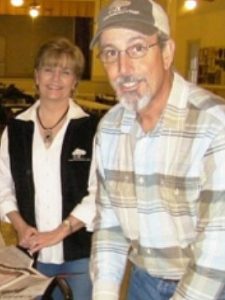 fter the meeting, many stayed just to visit and catch up with old friends. Second only to the good feeling that comes from helping horses in need, is the wonderful closeness felt by a diverse group with a common interest and a goal about which they are passionate. That is Georgia Equine Rescue League.
fter the meeting, many stayed just to visit and catch up with old friends. Second only to the good feeling that comes from helping horses in need, is the wonderful closeness felt by a diverse group with a common interest and a goal about which they are passionate. That is Georgia Equine Rescue League.
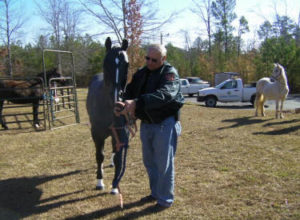 I hope our members and supporters are aware of the purpose and significance of our periodic “Multi-County Meetings”. These meetings are an assemblage of law enforcement and animal control officers which GERL brings together to impress upon them their role in carrying out enforcement of the equine protection laws which we are so fortunate to have in Georgia. Basically, it has traditionally been the responsibility of Georgia Department of Agriculture, Equine Division to enforce these laws and to rescue and rehabilitate starved and abused horses in our state. Just as our American economy has suffered in recent times, so has the state budget which supports the Equine Division of the GDA. O
I hope our members and supporters are aware of the purpose and significance of our periodic “Multi-County Meetings”. These meetings are an assemblage of law enforcement and animal control officers which GERL brings together to impress upon them their role in carrying out enforcement of the equine protection laws which we are so fortunate to have in Georgia. Basically, it has traditionally been the responsibility of Georgia Department of Agriculture, Equine Division to enforce these laws and to rescue and rehabilitate starved and abused horses in our state. Just as our American economy has suffered in recent times, so has the state budget which supports the Equine Division of the GDA. O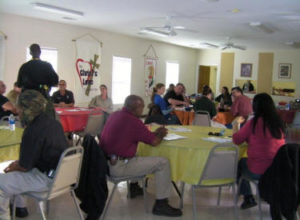 perating funds have been drastically cut, personnel have been reduced, and the number of horses GDA is permitted to impound has been reduced. Still, the number of horses being abused and neglected is growing. It is the equal responsibility of law enforcement and animal control to supplement the efforts of GDA to provide relief for these unfortunate animals, yet they seem reluctant to deal with equine abuse cases. This is totally understandable to GERL. How many Sherriff’s
perating funds have been drastically cut, personnel have been reduced, and the number of horses GDA is permitted to impound has been reduced. Still, the number of horses being abused and neglected is growing. It is the equal responsibility of law enforcement and animal control to supplement the efforts of GDA to provide relief for these unfortunate animals, yet they seem reluctant to deal with equine abuse cases. This is totally understandable to GERL. How many Sherriff’s
Deputies or Animal Control Officers have any experience in dealing with large animals? The answer is; not very many. Realizing
this, GERL has embarked on a program to teach these officers basic horse handling, the intricacies of the Georgia Equine Protection Act of 1992, and to educate them in how to build a successful case against abusers. Armed with this new knowledge, we find that officers become enthusiastic regarding their potential role in enforcing laws with which they were basically unfamiliar. GERL enlists the help of 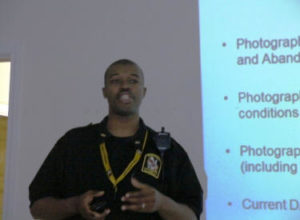 Department of Agriculture Equine Manager, Mat Thompson and DeKalb County Animal Control Supervisor, Kevin earst to speak at these meetings. The attendees are amazed and entertained by all they learn from these two very knowledgeable officers. Our most recent Multi-County Meeting was held in Milledgeville, GA on December 13th. The meeting was totally organized by GERL Baldwin and Putnam County Area Coordinator, Cynthia Anderson. She produced a great turnout representing several Georgia
Department of Agriculture Equine Manager, Mat Thompson and DeKalb County Animal Control Supervisor, Kevin earst to speak at these meetings. The attendees are amazed and entertained by all they learn from these two very knowledgeable officers. Our most recent Multi-County Meeting was held in Milledgeville, GA on December 13th. The meeting was totally organized by GERL Baldwin and Putnam County Area Coordinator, Cynthia Anderson. She produced a great turnout representing several Georgia
counties and the meeting was a huge success. We are always delighted when those attending agree to step up and try catching and haltering a live horse for the first time during one of our “hands on” Horse Handling Labs. Many of these folks have had little experience with animals, much less those the size of a horse! Even many of the Animal Control Officers are only accustomed to working with dogs and cats. We get the feeling that they will, after attending our training, be more apt to agree to intervene if they receive a call about a horse galloping down a highway in their jurisdiction. We HOPE that they will also be more incline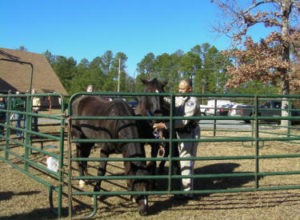 d to investigate starvation and cruelty reports in their counties and be better prepared to bring successful charges resulting in fines for offenders. Cynthia and her family saw to it that everyone had way more than adequate water, juice, coffee, fruit, and pastries during the morning session and then provided pizza for lunch. All officers left with 5 post credit hours which GERL is permitted to
d to investigate starvation and cruelty reports in their counties and be better prepared to bring successful charges resulting in fines for offenders. Cynthia and her family saw to it that everyone had way more than adequate water, juice, coffee, fruit, and pastries during the morning session and then provided pizza for lunch. All officers left with 5 post credit hours which GERL is permitted to
award and information concerning how GERL and GDA can help them with equine related matters when needed.
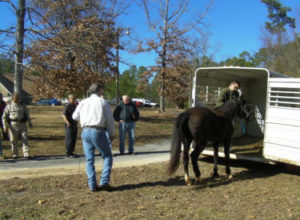
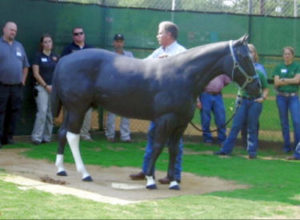 I was up early on the morning of June 28th as this was going to be a busy day. After months of planning the day of the multi-county law enforcement meeting had finally arrived. The air was full of excitement and, of course, it was going to be another hot steamy Georgia day. After taking care of my k9 gang I rushed over to the Winder Lions Club building to get the air conditioner on and get ready for the arrival of GERL members and the participants. GERL President, Patty Livingston and Secretary, Anne Ensminger, arrived with the horses. Anne set up registration while Patty attended to the horses. Lynn McMinn also brought her older horse.
I was up early on the morning of June 28th as this was going to be a busy day. After months of planning the day of the multi-county law enforcement meeting had finally arrived. The air was full of excitement and, of course, it was going to be another hot steamy Georgia day. After taking care of my k9 gang I rushed over to the Winder Lions Club building to get the air conditioner on and get ready for the arrival of GERL members and the participants. GERL President, Patty Livingston and Secretary, Anne Ensminger, arrived with the horses. Anne set up registration while Patty attended to the horses. Lynn McMinn also brought her older horse. 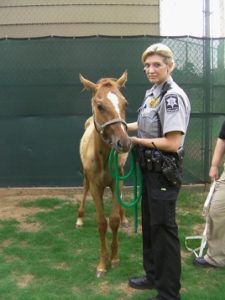 We had five horses, including “Bitty”, a very skinny little mare who had just come into our rescue program. We had invited twenty-two counties to attend and before too long the parking lot began to fill up with Sheriff’s cars and Animal Control vehicles. So we were off and running. The coffee was brewing. Barrow County Sheriff, Jud Smith was there to welcome all. Patty welcomed everyone on behalf of GERL and introduced GERL members and staff.
We had five horses, including “Bitty”, a very skinny little mare who had just come into our rescue program. We had invited twenty-two counties to attend and before too long the parking lot began to fill up with Sheriff’s cars and Animal Control vehicles. So we were off and running. The coffee was brewing. Barrow County Sheriff, Jud Smith was there to welcome all. Patty welcomed everyone on behalf of GERL and introduced GERL members and staff.
Mat Thompson of GDA gave a presentation about Georgia Equine Laws and Horses “101”. With the hot temps the hands on labs were held in mid morning with Mat doing all the training. He demonstrated how to catch a horse, halter the horse and lead. He also talked about color, body parts and used a life size plastic horse named “Easy Keeper” for the demos. The officers were divided into 4 groups to have hands on experience with the horses. They were required to catch and halter, and load onto a trailer. A Barrow County News reporter was there to cover the event and take photos. They published a great article about the multi-county law enforcement meeting and GERL.
Next was the important part of the day, lunch. A wonderful spread was put on by the Masters Table of Winder and was sponsored by Jared Skelton of A-Actions Bail Bonds and Fred Phillips of 24/7 Express Ankle Monitor Service, both of Lawrenceville. Community Bank and Trust of Winder provided bottled water.
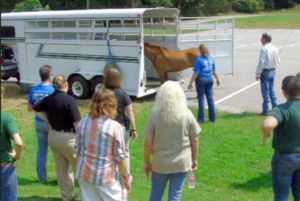 After lunch it was back to class, no time for siesta, as Mat continued with his power point demonstration. The subject of how much does a horse weigh and how to perform a body score were addressed. Kevin Hearst of DeKalb County Animal Control was there to do a presentation on prosecuting animal cruelty and evidence gathering. Kevin has a unique way of keeping your attention during his presentation. A question and answer period was followed by the presentation of certificates. It was good session and I know I learned some new things as I hope some the participants did.
After lunch it was back to class, no time for siesta, as Mat continued with his power point demonstration. The subject of how much does a horse weigh and how to perform a body score were addressed. Kevin Hearst of DeKalb County Animal Control was there to do a presentation on prosecuting animal cruelty and evidence gathering. Kevin has a unique way of keeping your attention during his presentation. A question and answer period was followed by the presentation of certificates. It was good session and I know I learned some new things as I hope some the participants did.
A great deal of thanks should go to the many GERL members who helped make this event a success. Many gave their time to come and work the event. To each I say thank you, we appreciate your efforts.
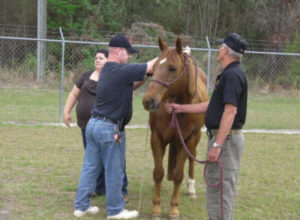 On Saturday, March 26, local area law enforcement and animal control officers attended GERL’s first south GA multi-county meeting held in Moultrie, GA. GERL officers presented information to area law enforcement and animal control officers educating them on GERL’s mission of combating the problem of equine abuse, starvation, neglect and abandonment throughout the state.
On Saturday, March 26, local area law enforcement and animal control officers attended GERL’s first south GA multi-county meeting held in Moultrie, GA. GERL officers presented information to area law enforcement and animal control officers educating them on GERL’s mission of combating the problem of equine abuse, starvation, neglect and abandonment throughout the state.
Because the problem of equine abuse, starvation, and abandonment has reached epic proportions in Georgia due to the closing of slaughterhouses, continued indiscretionary breeding practices, hoarding of equine, and a failing economy and because the Georgia Department of Agriculture’s Equine Division, which has traditionally been charged with enforcing Georgia’s equine protection laws, is grossly understaffed, it is imperative that more outreach and education be conducted to help combat this continued problem of equine abuse and neglect.
The goals of the multi-county meetings were four-fold: 1) To meet with interested law enforcement and animal control agencies throughout Georgia to ask for their increased participation in enforcing humane care for equine laws; 2) To offer GERL’s support and assistance to law enforcement and animal control agencies that are willing to become involved in protecting equine; 3) To educate law enforcement and animal control personnel on how to evaluate situations concerning possible starvation or inadequate care for equine, as covered by law; and 4) To build a network of contacts among 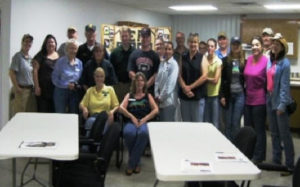 GERL, GDA, law enforcement, and animal control to resolve problems relating to equine.
GERL, GDA, law enforcement, and animal control to resolve problems relating to equine.
This south GA multi-county meeting was a first attempt at outreach to educate those working locally in the area of animal control. Presentations were made by Officer Kevin Hearst of Decatur regarding increased law enforcement efforts in the northern part of the state and more severe penalties and prosecution of offenders of equine cruelty and abuse. Officer Hearst informed the attendees that more counties are beginning to pay attention to this problem of neglect, cruelty and abuse and those present were briefed on policies, procedures, and available resources to assist them in prosecuting cases.
During lunch, Robin Easley educated attendees on proper equine care and management by presenting a vivid power-point demonstrating varying degrees of cases of abuse and neglect. Participants were also shown how to body score, catch and load a horse with some of them practicing hands on.
This first time meeting was highly informative and a huge success! As a result and with $3,000 worth of financial assistance from GERL, both the Lakeland and Adel, GA Animal Agencies have recently gotten together to erect a holding facility in the area. GERL thanks Judy Ricketson, Area Coordinator for Lowndes County, and her local volunteers, who helped put this event together. GERL looks forward to hosting more multi-county meetings of this nature and plans to make this an annual event in South Georgia.
DRAMA-FREE HORSE HANDLING, CATCHING, AND LOADING
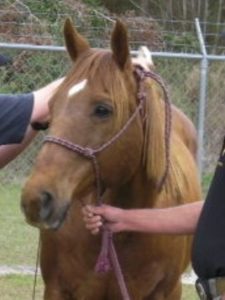 BASIC EQUIPMENT NEEDED TO CATCH A HORSE: Bucket with food, halter, and lead rope. If no halter is available, use a rope to make one loop over nose and one behind the ears. If you have no equipment, you might be able to put a belt around the horse’s neck to lead it. It is very important that you stay quiet. Do not raise your voice or wave your arms. The more excited you are, the more likely they are to leave. If they think you just want to feed them, they might let you catch them.
BASIC EQUIPMENT NEEDED TO CATCH A HORSE: Bucket with food, halter, and lead rope. If no halter is available, use a rope to make one loop over nose and one behind the ears. If you have no equipment, you might be able to put a belt around the horse’s neck to lead it. It is very important that you stay quiet. Do not raise your voice or wave your arms. The more excited you are, the more likely they are to leave. If they think you just want to feed them, they might let you catch them.
BACK UP PLANS: Try to keep the horse in sight if you cannot catch him. Most horses do not spend unnecessary energy and can find their way back to their own pasture. As you know, a horse can cause considerable damage to a car and vice versa. My primary concern would be stop oncoming traffic if a horse is near a road.
TRAILER AND KNIFE.
Horses are more likely to volunteer to get into a stock trailer than any other kind of trailer because stock trailers are open and spacious compared to other types. A stock trailer does not require a horse to learn to back off the trailer. If the horse does not seem to know how to back up, turn it around and let it come off the trailer forwards. This is not one of your options with a two-horse trailer.
Horses do not respond well to force; it typically causes them to shut down and refuse to cooperate. The more force you use, the more resistance you will create. Most important things about loading are that you recheck the trailer is correctly hitched and that lights and brake are working. Never tie a horse inside of a trailer until after you shut the trailer back door. It is amazing how fast they can run backwards. When they run backwards after they are tied, they will hurt you and/or themselves. After you have shut the doors, tie the horse and open the door just enough to let yourself out quietly. Don’t forget to reclose the door when you leave the trailer.
HORSES CAN HURTYOU AND DO NOT RESPOND WELL TO FORCE.
B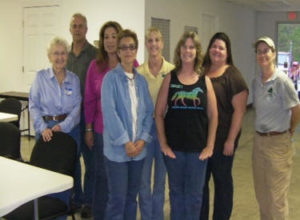 ecause of their size and power, a horse can easily hurt you without even trying. The absolute most important thing if you to remember nothing else: NEVER WRAP A LEAD ROPE AROUND YOUR HAND. YOU CAN LOSE FINGERS. MAKE A LOOP AND WRAP YOUR HAND AROUND THE LOOP. SEE PICTURES.
ecause of their size and power, a horse can easily hurt you without even trying. The absolute most important thing if you to remember nothing else: NEVER WRAP A LEAD ROPE AROUND YOUR HAND. YOU CAN LOSE FINGERS. MAKE A LOOP AND WRAP YOUR HAND AROUND THE LOOP. SEE PICTURES.
Always use as little pressure as you can. The calmer and quieter you are the more the horse is going to want to be with you. The higher your energy, the more likely you are to get hurt. You should always approach horses with quiet confidence. Never raise your voice. Horses do not understand words. They understand tone, volume, and body language. They know a calm and confident leader when they see one. You can fake confidence.
When handling horses always carry a sharp knife so that you will be able to cut the rope and free the horse if it gets into trouble. Horses frequently get into trouble. Not all horses know how to tie. Their first and natural reaction to feeling restrained is to pull away. The next thing they will do is jump forward. Therefore, whatever is between the horse and the solid object it is tied to will be smashed. Make sure that isn’t you. (picture of knife)
HOW TO TIE A HORSE.
When you are dealing with a loose horse, you will not know for sure that it has been taught to tie. A horse is not born understanding how to be led or tolerate being tied. Young horses may not have any idea what you are asking and will pull back. You cannot drag them, but if you put another rope around their rear they will move forward to get away from how that feels.
It is always best to have someone hold the horse instead — if you have a choice. When you do tie them, never tie a knot in the rope. Always loop the rope and end with a quick release “dangle” that you can quickly pull to free the horse in an emergency. Knots invite chaos especially if you have forgotten your knife. (picture of dangle).
TYPES OF HALTERS
T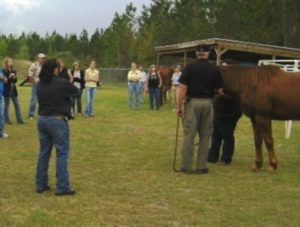 here are two basic types of halter; the rope halter with lead attached and the usually nylon but sometimes leather halter that has a ring for attaching a lead rope. Both have advantages and disadvantages. The rope halter will not break which can be a good thing or a bad thing if a horse flips over backwards. Rope halters are also not as easy to put on. They usually come with a lead rope. There are four steps to putting on a rope halter correctly. (pictures of steps)
here are two basic types of halter; the rope halter with lead attached and the usually nylon but sometimes leather halter that has a ring for attaching a lead rope. Both have advantages and disadvantages. The rope halter will not break which can be a good thing or a bad thing if a horse flips over backwards. Rope halters are also not as easy to put on. They usually come with a lead rope. There are four steps to putting on a rope halter correctly. (pictures of steps)
Most people are more comfortable with the less complicated nylon or leather halter. They usually have two buckles, one that goes under the left ear and one that goes under the jaw. You only need to undo one or the other of these buckles to put this halter on the horse. The buckle on this halter will break if the horse pulls back hard enough which can also be a bad thing. For example, when they pull back, break the halter, run away, and you have to catch them again. You will need to attach a lead rope in advance. It isn’t a good idea to try to handle a horse without a lead rope because you will have no leverage and they can pull you around at will like a rag doll. Here is a picture of a nylon halter and how to arrange it on your left hand before you attempt to put it on the horse.
A third type of halter is called a shipping halter. It is one piece and is harder to break than a nylon or leather halter. Whatever type you use, things will always go better if you prearrange any kind of halter onto your left hand in the reverse order of how it goes on the horse before you approach the horse. (pictured)
